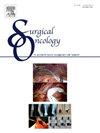Prophylactic drain placement versus non-drainage following gastric cancer surgery: A systematic review and meta-analysis of randomized controlled trials
IF 2.4
4区 医学
Q3 ONCOLOGY
引用次数: 0
Abstract
Gastric cancer remains a significant global health burden and a leading cause of cancer-related deaths. Surgical resection is the primary curative treatment, but postoperative complications can negatively impact outcomes. Prophylactic drainage (PD) has been widely used to reduce these complications by facilitating early detection and management of fluid collections. This study evaluates the role of PD following gastric cancer surgery through a systematic review and meta-analysis of randomized controlled trials (RCTs). We searched PubMed, Web of Science, Scopus, and Cochrane databases up to January 15, 2025, and analyzed dichotomous data using risk ratio (RR) and continuous data using mean difference (MD), both with 95 % confidence intervals (CI), using R version 4.3 (PROSPERO ID: CRD42025650045). Four RCTs involving 728 patients were included. The analysis revealed that PD was associated with a significantly lower risk of mortality compared to no drainage (RR: 0.45 [95 % CI: 0.21–0.94]; P = 0.03). However, there were no significant differences between the drainage and non-drainage groups in the incidence of intra-abdominal abscess (RR: 1.23 [95 % CI: 0.49–3.06]; P = 0.66), surgical-site infection (RR: 0.93 [95 % CI: 0.56–1.52]; P = 0.76), pulmonary infection (RR: 0.66 [95 % CI: 0.37–1.18]; P = 0.16), duodenal stump leakage (RR: 1.54 [95 % CI: 0.51–4.71]; P = 0.45), anastomotic leakage (RR: 1.47 [95 % CI: 0.64–3.39]; P = 0.37), or reoperation rates (RR: 0.95 [95 % CI: 0.40–2.27]; P = 0.90). Additionally, no significant differences were observed in the length of hospital stay (MD: 0.10 [95 % CI: −0.39 to 0.58]; P = 0.70) or time to the first soft diet (MD: 0.21 [95 % CI: −0.09 to 0.50]; P = 0.17). In conclusion, PD following gastric cancer surgery is associated with a reduced risk of mortality but does not significantly impact the incidence of perioperative complications or recovery metrics. These findings suggest that while PD may offer a survival benefit, it does not appear to reduce common postoperative complications or accelerate recovery.
胃癌手术后预防性引流与非引流:随机对照试验的系统回顾和荟萃分析
胃癌仍然是一个重大的全球健康负担,也是癌症相关死亡的主要原因。手术切除是主要的治疗方法,但术后并发症会对预后产生负面影响。预防性引流(PD)已被广泛用于通过促进早期发现和管理液体收集来减少这些并发症。本研究通过随机对照试验(rct)的系统评价和荟萃分析来评估PD在胃癌手术后的作用。我们检索了PubMed、Web of Science、Scopus和Cochrane数据库,截止到2025年1月15日,使用R版本4.3 (PROSPERO ID: CRD42025650045),使用风险比(RR)分析二分数据,使用均值差(MD)分析连续数据,两者的置信区间(CI)均为95%。纳入4项随机对照试验,共728例患者。分析显示,与不引流相比,PD与死亡风险显著降低(RR: 0.45 [95% CI: 0.21-0.94];p = 0.03)。然而,引流组与非引流组腹内脓肿发生率无显著差异(RR: 1.23 [95% CI: 0.49-3.06];P = 0.66)、手术部位感染(RR: 0.93 [95% CI: 0.56-1.52];P = 0.76)、肺部感染(RR: 0.66 [95% CI: 0.37 ~ 1.18];P = 0.16),十二指肠残端渗漏(RR: 1.54 [95% CI: 0.51-4.71];P = 0.45),吻合口漏(RR: 1.47 [95% CI: 0.64-3.39];P = 0.37)或再手术率(RR: 0.95 [95% CI: 0.40 ~ 2.27];p = 0.90)。此外,住院时间没有显著差异(MD: 0.10 [95% CI: - 0.39至0.58];P = 0.70)或第一次软性饮食的时间(MD: 0.21 [95% CI:−0.09 ~ 0.50];p = 0.17)。总之,胃癌手术后PD与死亡率降低相关,但对围手术期并发症的发生率或恢复指标没有显著影响。这些发现表明,虽然PD可能提供生存的好处,但它似乎并没有减少常见的术后并发症或加速恢复。
本文章由计算机程序翻译,如有差异,请以英文原文为准。
求助全文
约1分钟内获得全文
求助全文
来源期刊

Surgical Oncology-Oxford
医学-外科
CiteScore
4.50
自引率
0.00%
发文量
169
审稿时长
38 days
期刊介绍:
Surgical Oncology is a peer reviewed journal publishing review articles that contribute to the advancement of knowledge in surgical oncology and related fields of interest. Articles represent a spectrum of current technology in oncology research as well as those concerning clinical trials, surgical technique, methods of investigation and patient evaluation. Surgical Oncology publishes comprehensive Reviews that examine individual topics in considerable detail, in addition to editorials and commentaries which focus on selected papers. The journal also publishes special issues which explore topics of interest to surgical oncologists in great detail - outlining recent advancements and providing readers with the most up to date information.
 求助内容:
求助内容: 应助结果提醒方式:
应助结果提醒方式:


